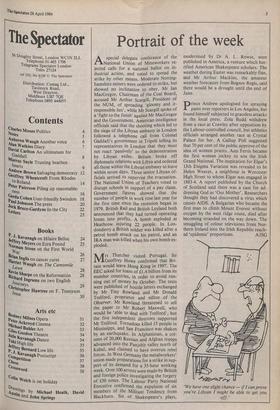Portrait of the week
A special delegate conference of the r1 NationalUnion of Mineworkers re- jected calls for a national ballot on in- dustrial action, and voted to spread the strike by other means. Moderate Notting- hamshire miners were ordered to strike, but showed no inclination to obey. Mr Ian MacGregor, Chairman of the Coal Board, accused Mr Arthur Scargill, President of the NUM, of spreading 'gloomy and ir- responsible lies', while Mr Scargill spoke of a 'fight to the finish' against Mr MacGregor and the Government. American intelligence officials said that the shooting which led to the siege of the Libyan embassy in London followed a telephone call from Colonel Gaddafi's government in Tripoli telling its representatives in London that they must not react `passively' to the demonstration by Libyan exiles. Britain broke off diplomatic relations with Libya and ordered all those within the Libyan embassy to leave within seven days. Three senior Libyan of- ficials arrived to supervise the evacuation. The National Union of Teachers voted to disrupt schools in support of a pay claim. Government figures showed that the number of people in work rose last year for the first time since the recession began in 1979. British Rail and British Leyland both announced that they had turned operating losses into profits. A bomb exploded at Heathrow injuring 22 people. In Lon- donderry a British soldier was killed after a petrol bomb attack on his patrol, and an IRA man was killed when his own bomb ex- ploded.
Mrs Thatcher visited Portugal. Sir Geoffrey Howe confirmed that Bri- tain would leave Hong Kong in 1997. The EEC asked for loans of £1.4 billion from its member countries, in order to avoid run- ning out of money by October. The texts were published of hostile letters exchanged by Mr Tiny Rowland and Mr Donald Trelford, proprietor and editor of the Observer. Mr Rowland threatened to sell the paper to Mr Robert Maxwell, who would be 'able to deal with Trelford', but the five independent directors supported Mr Trelford. Tornadoes killed 15 people in Mississippi, and San Francisco was shaken by an earthquake. In Afghanistan, a col- umn of 20,000 Russian and Afghan troops advanced into the Panjshir valley north of Kabul, and claimed to have overrun rebel forces. In West Germany the metalworkers' union made preparations for a strike in sup- port of its demand for a 35-hour working week. Over 100 arrests were made by British and foreign police investigating the forgery of £50 notes. The Labour Party National Executive confirmed the expulsion of six members of the Militant Tendency from Blackburn. Six of Shakespeare's plays,
modernised by Dr A. L. Rowse, were published in America, a venture which hor- rified American Shakespeare scholars. The weather during Easter was remarkably fine, and Mr Arthur Mackins, the amateur weather forecaster from Bognor Regis, said there would be a drought until the end of June.
prince Andrew apologised for spraying
paint over reporters in Los Angeles, but found himself subjected to graceless attacks in the local press. Zola Budd withdrew from a race at Crawley after opposition by the Labour-controlled council, but athletics officials arranged another race at Crystal Palace for her. A Gallup Poll suggested that 70 per cent of the public approve of the idea of women priests. Ann Ferris became the first woman jockey to win the Irish Grand National. The inspiration for Elgar's 13th Enigma Variation was revealed to be Helen Weaver, a neighbour in Worcester High Street to whom Elgar was engaged in 1883-4. A report published by the Church of Scotland said there was a case for ad- dressing God as 'Our Mother'. Researchers thought they had discovered a virus which causes AIDS. A Bulgarian who became the first man to climb Mount Everest without oxygen by the west ridge route, died after becoming stranded on the way down. The smuggling of colour televisions from Nor- thern Ireland into the Irish Republic reach- ed 'epidemic' proportions. AJSG 'We have one slight chance — if I can prove you're Libyan I might be able to get you off.'










































 Previous page
Previous page